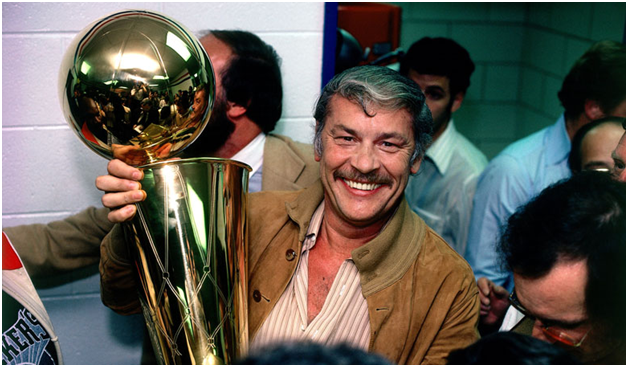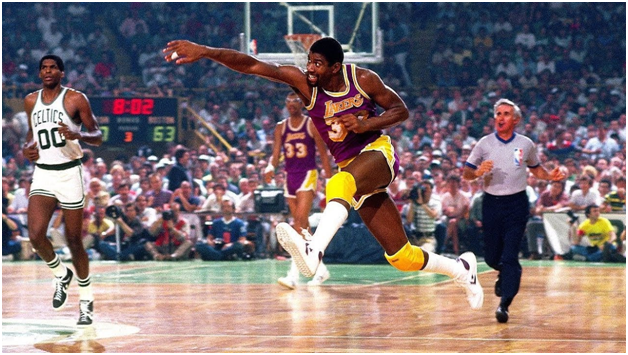Sports as a spectacle? Here’s how this team owner redefined basketball in the 1980s! [Monday: Marketing Marvels]

Miles Everson’s Business Builder Daily speaks to the heart of what great marketers, business leaders, and other professionals need to succeed in advertising, communications, managing their investments, career strategy, and more.
A Note from Miles Everson:
Hello, everyone!
How are you? We hope all is well in both your personal life and work life.
Let’s start the week strong with talks about our “Marketing Marvels”—outstanding people in the fields of business and marketing. Each Monday, we highlight these people’s experiences, contributions, and impact on society.
Today, we’ll talk about a sports team owner who revolutionized basketball in the 1980s.
Keep reading to know more about this “Marvel” and how he left his mark in the world of basketball.
Miles Everson
CEO, MBO Partners
Chairman of the Advisory Board, The I Institute
Marketing Marvels
In this day and age, when people encounter the word “basketball,” the first thing that comes to their minds is the National Basketball Association (NBA) and its athletes. Social media platforms such as Instagram, YouTube, TikTok, and Twitter are filled to the brim with content produced by different teams and players.
Did you know the NBA wasn’t as famous back then as it is now?
More than 40 years ago, no one was interested in watching NBA games. TV viewership and game attendance were poor, leading some people to entertain the idea of the league and its teams going bankrupt.
Moreover, the prospect of owning an NBA team at the time was met with little to no enthusiasm. People thought it was a waste of money. However, one person changed this perception.

Photo from NBA
Dr. Gerald “Jerry” Hatten Buss (January 27, 1933 to February 18, 2013) was the owner of the Los Angeles Lakers, one of the 30 teams in the NBA, from 1979 to 2013. He also owned a World Team Tennis organization, the Los Angeles Strings.
Prior to becoming a sports team owner, he was a real estate magnate. His firm, Mariani-Buss Associates, had properties in California, Arizona, and Nevada.
Buss was a sports fan by heart. Out of all the sports he watched, basketball was his favorite. He believed this sport can become an entertainment attraction so he set his sights on acquiring a team of his own. He didn’t need to look far, because there was a team based in Los Angeles—the city he called home.
Buss got his wish in 1979, when Lakers’ original owner Jack Kent Cooke sold the basketball team, the Los Angeles Kings (National Hockey League team), and the Forum (an indoor sports venue) to him for a USD 67.5 million price tag.
With the Lakers, he had a competitive team with superstar Kareem Adbul-Jabbar and rookie sensation Earvin “Magic” Johnson. However, like the rest of the NBA at the time, the team struggled with popularity and viewership.
By the end of the 1970s, the NBA struggled to keep fans glued to their seats at arenas and at home. Sports domes were empty and games were aired on TV after they were played. This led some people to believe the league was on the verge of collapse, and others thought of this as a major setback.
… but Buss had a different mindset.
He saw this as his golden opportunity to make a name for himself in the sport he wanted to revolutionize. His answer to the NBA and his team’s popularity problem?

Photo from YouTube
Showtime!
“Showtime” was a term used to refer to the dazzling and fast-paced playstyle of the Lakers that kept the fans at the edge of their seats night in and night out. This playstyle helped the team win 5 NBA championships in the 1980s.
The term was also used to refer to the Lakers’ glamorous brand identity.
With the team’s captivating on-court playstyle and dynamic superstars, Buss saw the potential of the squad as a great entertainment product. For him, basketball was a spectacle for people to enjoy, so he based his marketing strategy on this belief.
Inspired by the glitz and glamor of hollywood, Buss implemented these strategies no one in the NBA thought of at the time:
- He commissioned cheerleaders to perform during halftime and time outs.
- He created a live band to perform for fans during Lakers’ home games.
- He created the “Forum Club”—a VIP bar where season ticket holders, celebrities, and players could hang out before and after the games.
- He came up with tiered pricing for seats, which meant people from different income brackets could attend the games.
- He sold courtside seats to anyone who wanted to see the players up close. At the time, these seats were exclusive to the press and media.
- To increase viewership, the games were broadcasted through Prime Ticket, a basic cable channel. During the 1980s, NBA games were broadcast on a pay-per-view basis.
- He was also the first owner to sell the naming rights of an arena, thereby opening up another revenue stream for the Lakers.
Buss took advantage of his team’s on-court performance by coming up with strategies that magnified the group’s greatness. With his squad, basketball became an entertainment spectacle.
The innovations put in place allowed the Lakers to stand out from the rest of the league from a brand and marketing perspective. Watching the team play became a must-see affair for fans, celebrities, and other people.
The use of the strategies mentioned above also had grander implications for the league and basketball—it showed how the sport can be marketed as an entertainment product. Additionally, these marketing efforts revealed how media exposure can increase brand awareness and popularity for the sport.
Thanks to Buss’ brilliant strategies, the “Showtime” Lakers laid the groundwork for modern NBA—a league associated with entertainment, drama, and narrative.
Some of the lessons you can take away from his and the Lakers’ story?
- As a marketer or business owner, you shouldn’t be afraid to come up with out-of-the-box strategies for your product or brand.
- You should carefully assess the strengths of your product and come up with ways to magnify its positive characteristics through marketing.
- Be receptive to the unmet needs of your target market.
As you’ve seen in today’s “Marvel,” having a creative mindset in marketing your brand or product is important.
These takeaways are simple, yet powerful enough to make you succeed in achieving your marketing goals.
We hope you come up with ways to effectively use these strategies too!
(This article is from The Business Builder Daily, a newsletter by The I Institute in collaboration with MBO Partners.)
About The Dynamic Marketing Communiqué’s
“Monday Marketing Marvels”
Too often, industry experts and the marketing press sing the praises of some brand or company’s marketing strategy.
… only for the audience to later find out that its product was a flop, or worse, that the brand or company went bankrupt.
The true ROI in marketing can’t be separated from the business as a whole.
What good is a marketing case study if one can’t prove that the company’s efforts actually paid off?
At the end of the day, either the entire business is successful or it isn’t. And the roles of marketing and communication are always paramount to that success.
Every Monday, we publish a case study that highlights the world’s greatest marketing strategies, marketers, and communicators.
However, the difference between our articles and the numerous ones out there is that we will always make certain that the firm really did generate and demonstrate earning power worthy of study in the first place (compliments of Valens Research’s finance group) in keeping with a person’s leadership skills in the area of marketing and/or communication.
We’ll also study the greatest marketing fails and analyze what they did wrong, or what they needed to improve. We all make our mistakes, but better we learn from others’ mistakes—and earlier, rather than later.
Hope you found this week’s marketing marvel interesting and helpful.
Stay tuned for next week’s Monday Marketing Marvels!
Cheers,
Kyle Yu
Head of Marketing
Valens Dynamic Marketing Capabilities
Powered by Valens Research
www.valens-research.com




